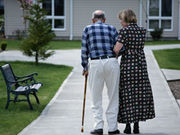More than half of older adults have slow gait at one month after acute myocardial infarction
TUESDAY, March 8, 2016 (HealthDay News) — At one month after acute myocardial infarction (AMI), many older adults have slow gait, which is associated with increased risk of death or readmission at one year, according to a study published online March 1 in the Journal of the American Geriatrics Society.
John A. Dodson, M.D., M.P.H., from New York University in New York City, and colleagues conducted an observational cohort study with longitudinal follow-up in 24 U.S. hospitals. Three hundred thirty-eight older adults (aged 65 years and older) with in-home gait assessment at one month after AMI were enrolled.
The researchers found that 53.6 percent of participants had slow gait (<0.8 m/s); they were older, more likely to be female and nonwhite, and had increased prevalence of heart failure and diabetes mellitus. Compared to those with preserved gait, participants with slow gait were more likely to die or to be readmitted to the hospital within one year (35.4 versus 18.5 percent; P = 0.006). After adjustment for age, sex, and race, this correlation persisted (hazard ratio, 1.76; 95 percent confidence interval, 1.08 to 2.87); after adding clinical factors, the correlation was no longer significant (hazard ratio, 1.23; 95 percent confidence interval, 0.74 to 2.04).
“Slow gait, a marker of frailty, is common one month after AMI in older adults and is associated with nearly twice the risk of dying or hospital readmission at one year,” the authors write.
Several authors disclosed financial ties to the pharmaceutical and health care industries.
Copyright © 2016 HealthDay. All rights reserved.








